Training, skills development, and traditional healing the focus at Northern Caucus
From November 26-28, 2018, leadership from 54 Northern First Nations gathered in the Lheidli T'enneh territory (Prince George, BC) for Northern Caucus. Ten Chiefs, 31 Proxies, 28 Health Directors/Health Leads and 23 Social Leads attended the three-day session focused on health system improvement for First Nations in the Northern region.
Lessons in situational awareness by Elder Clifford Quaw
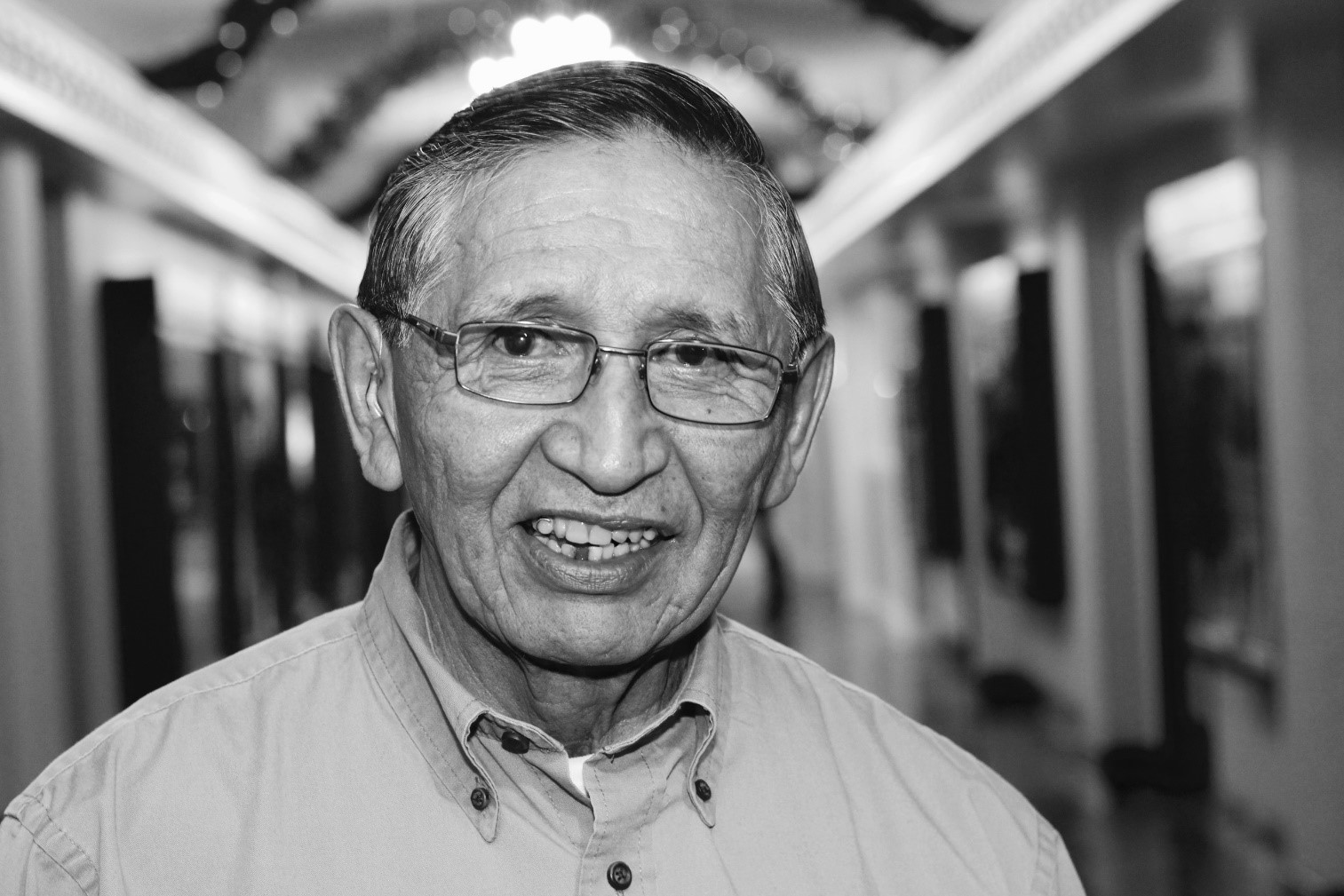
Elder Clifford Quaw opened the meeting all three days and welcomed delegates to the Lhedli T'enneh territory. Elder Quaw grounded the delegates with his humour and teachings – encouraging knowing where you are, what to pay attention to, and the importance of minding your own personal blindspots. The strong theme of place would figure centrally through three days of deliberations.
Ceremony to welcome winter
In 2018, wildfires impacted Northern communities disproportionately. The hashtag #tahltanstrong testifies to the resilience of Telegraph Creek residents, many of whom lost their homes. When the Northern Caucus coincided with the lifting of a three-month evacuation order for Telegraph Creek residents, northern knowledge keepers marked the event with ceremony. A welcoming winter ceremony was carried out by Della Owens [Saulteau First Nation] and Connie Greyeyes [Bigstone Cree First Nation] to acknowledge and heal from the wildfires of the summer. Delegates participated in a brushing off ceremony through the four cardinal directions.
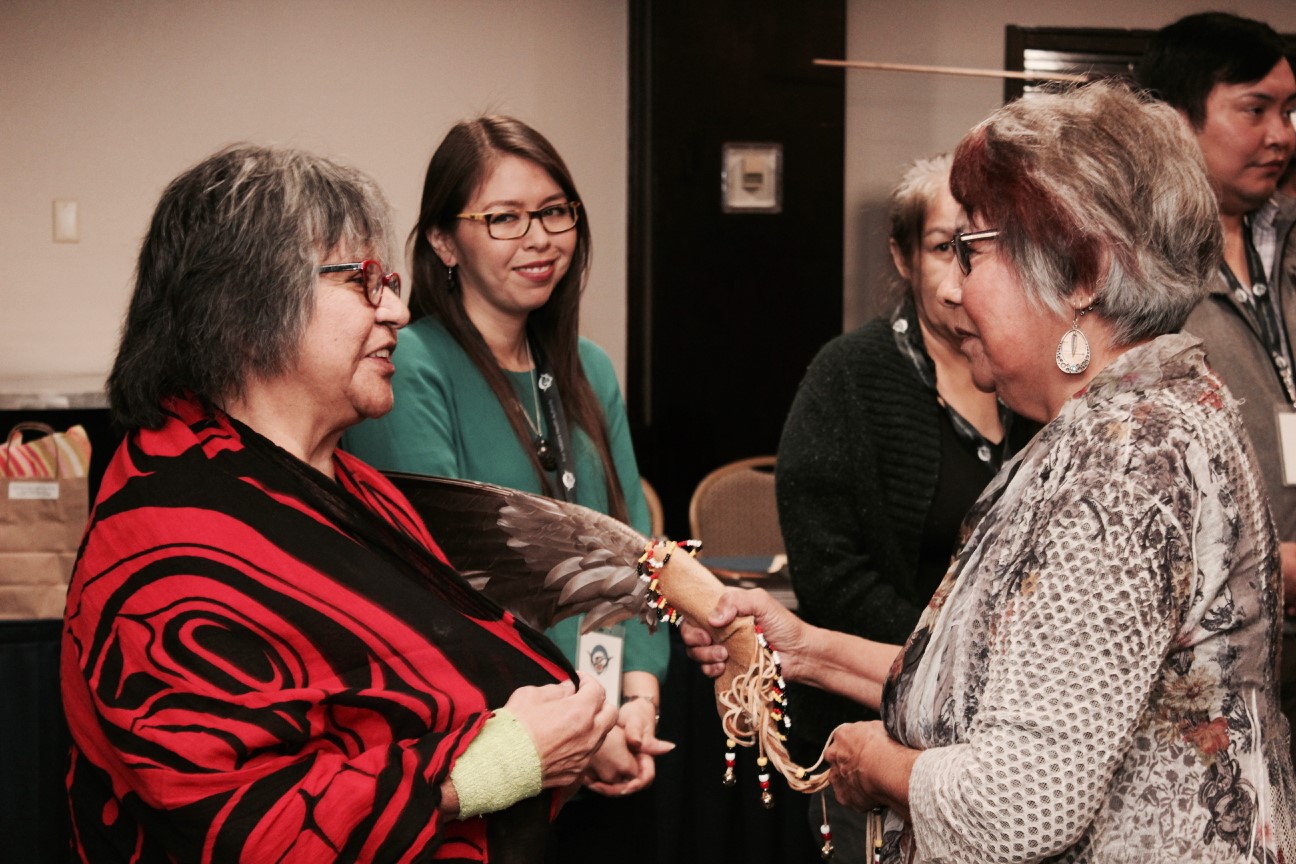
Della Owens [Saulteau First Nation] asked delegates to stand up in the four cardinal directions and performed a brushing off ceremony.
When Industry comes to town
While the Murdered and Missing Women's Inquiry hearings heard final submissions in Calgary, a localized discussion took root among northern delegates "No one is going to do this work for us" said Connie Greyeyes who presented on Missing and Murdered Indigenous Women with support from Della Owens. Greyeyes spoke of the connection between violence to Indigenous lands and the violence perpetrated on Indigenous women stating that "When industry comes to town it's not only the land that suffers, it's the people, especially women and girls." Greyeyes and Owens hosted a breakout discussion and encouraged delegates to read Out of Sight, Out of Mind a recent report by Amnesty International aimed at ensuring the safety of Indigenous women and girls in northeast BC, Canada, an area with massive hydroelectric, oil, gas, and coal projects.
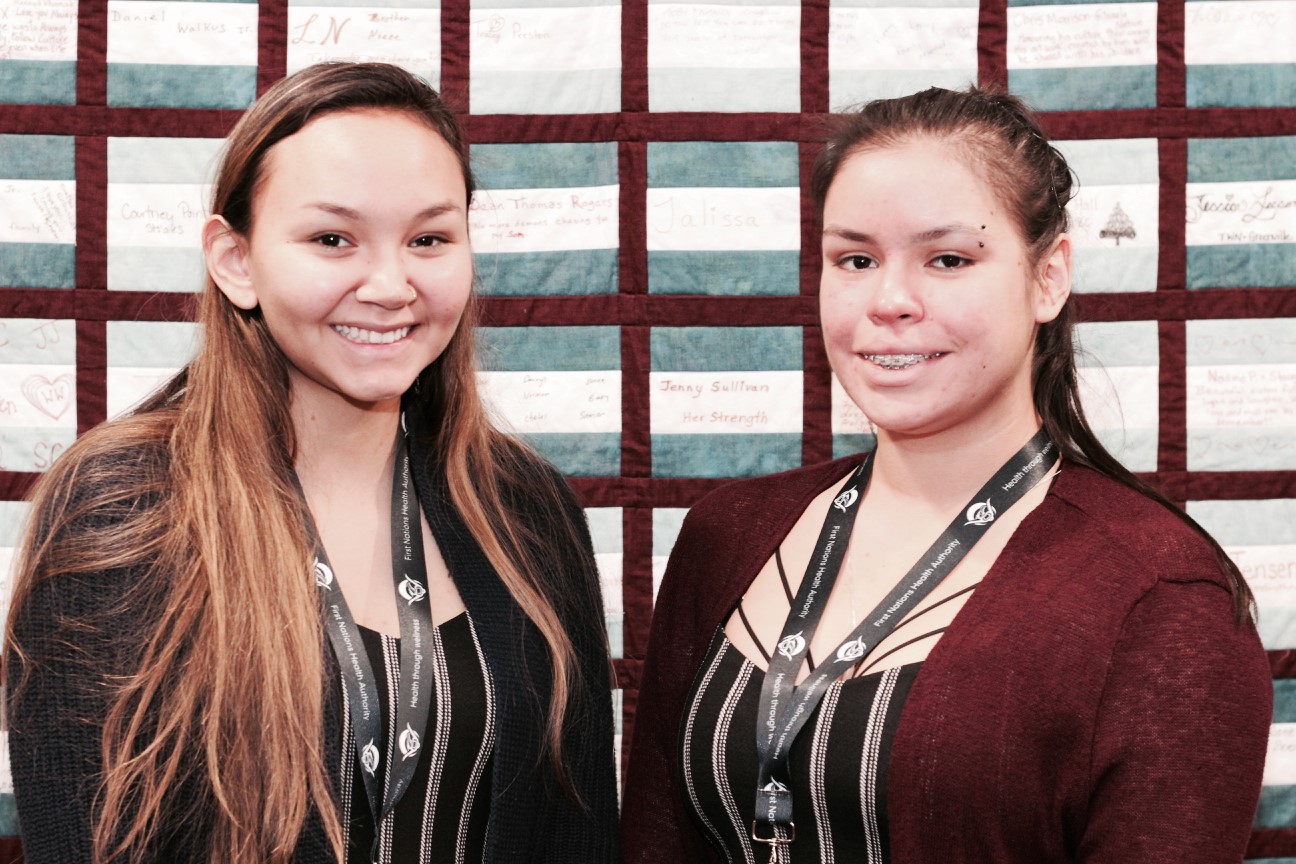
Northern youth Aidan Harris (left) and Jasmine Gawa (right) helped facilitate governance discussions at the Northern Caucus. Aidan Harris, Wet'suwet'en and Gitxsan Nation, Laxsilyu (Little Frog Clan) is currently in her first year of biochemistry and molecular biology - she is hoping to go to medical school after getting her degree. Jasmine Gawa is from the Gitxsan Nation, her clan is Gisk'ahaast from the house of Tsibassa. Jasmine's educational goal is to become a nurse but not stop there and keep furthering her education in health to give back to her people and community.
Governance
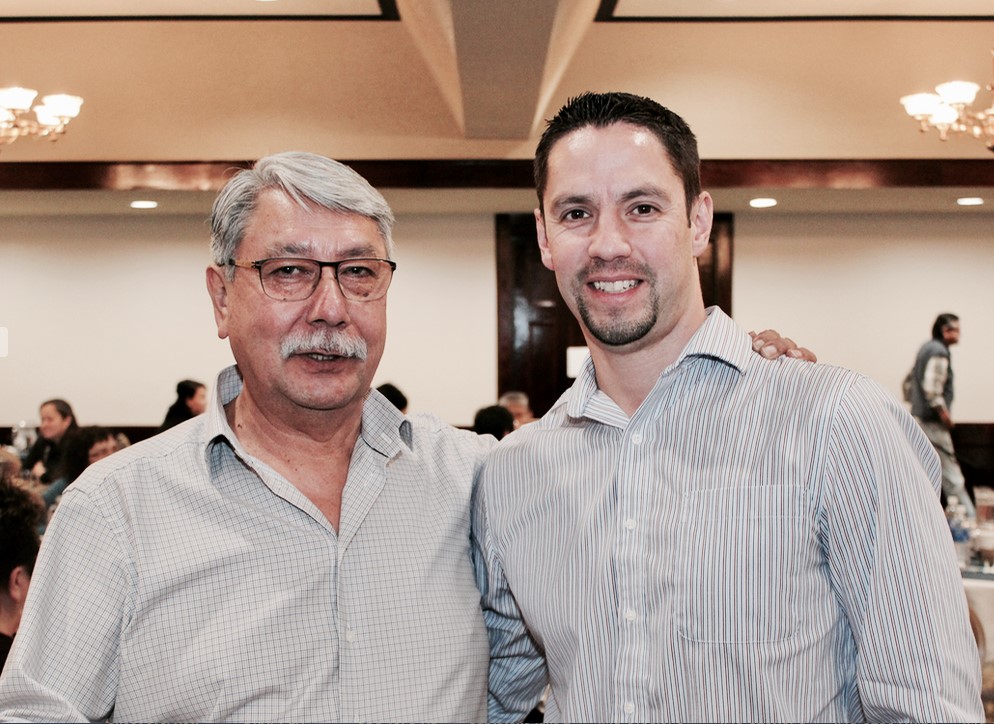
Satsan, Herb George [Gitxsan] delivered an interactive workshop on transforming governance with support from Mark Matthew [Simpcw], Manager Engagement and Coordination, FNHA.
"Something has happened to us in the last 150 years that we aren't exercising our inherent right to self-government." Said Satsan, Herb George [Gitxsan] kicking off a workshop that drew strong connections between healing, wellness and self-determination. Titled Transformational Governance, the interactive workshop drew advice from Northern delegates in each of the Five Pillars needed to transform governance in First Nations communities including The People, The Land, Laws and Jurisdiction, Governance, Resources. Satsan issued a strong call to action which was picked up by the delegates "The babies being born today are the 8thgeneration from the Indian Act, it is incumbent upon us to stop this so that it never affects another generation, our children do not deserve to live like this. We have to do something about it."
Following the workshop Cindy Boiko [Haida] Haida Gwaii Health Centre reflected "For First Nations people the law and systemic prejudice are so old there is hardly a memory. We are fighting against laws that were created against us. Still we manage to beat them at their own game. Right now there is so much fear of change and competition between us, I'm mindful there is so much work for us to do."
Mental Health and Wellness Funding
Cultural and language are integral to identity and healing, and now a new $30 million fund will support the integration of First Nations ways of knowing and being into health and wellness services. Northern delegates learned about the new mental health fund through presentations from FNHC and FNHA. FNHC Deputy Chair Allan Louis [Sylix] introduced the fund with a personal reflection "When I was a child in the 60's, our parents and grandparents had the language, had the culture but they were hesitant to pass it down because of the racism, they wanted to protect us and for us to have a different set of skills for survival. Where today, my granddaughter is just about fluent in our language, and now it's the younger people teaching us --the older generation, it's coming full circle."
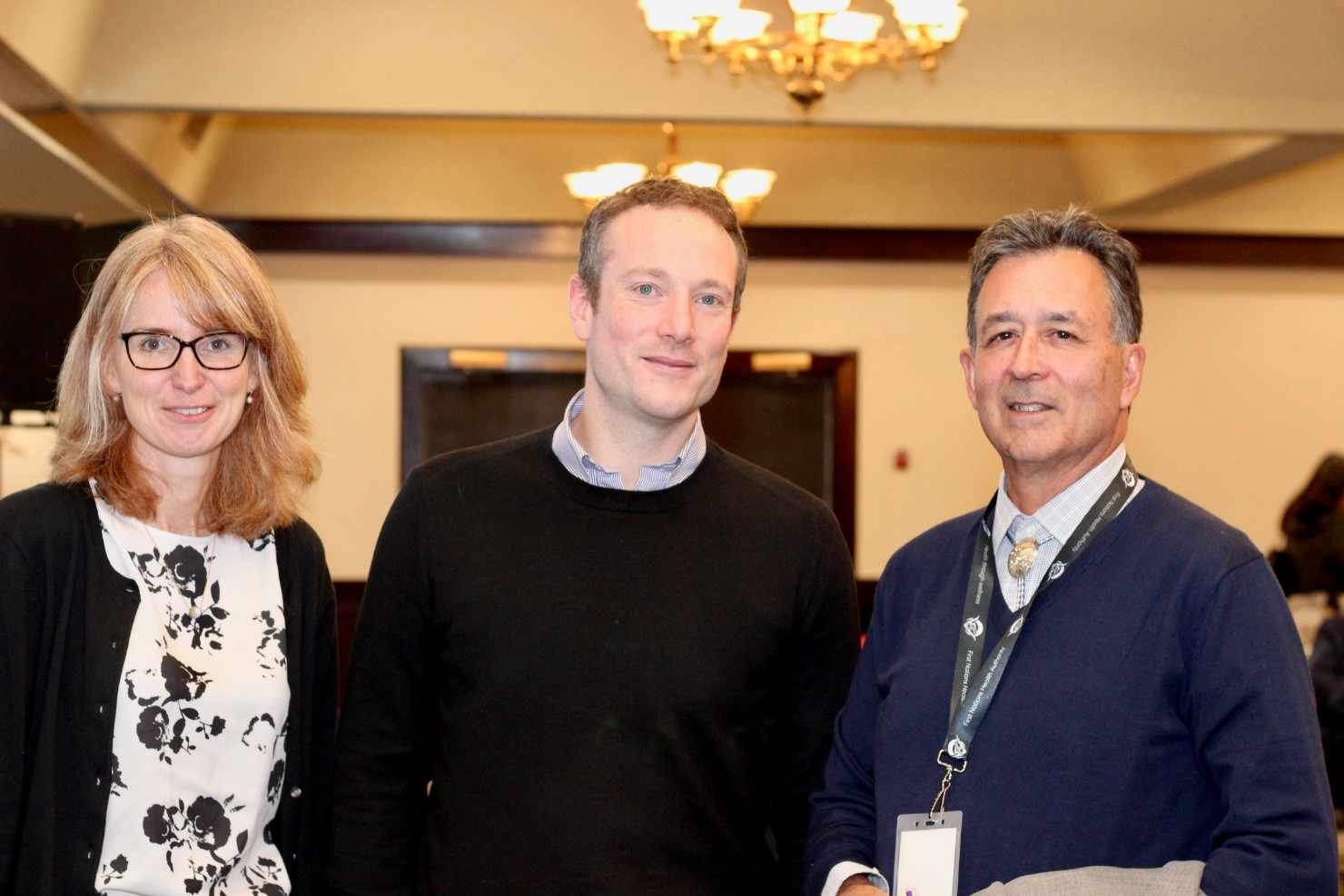
A panel presentation on 30-million-dollar mental health fund was led by Katie Hughes, Executive Director, Mental Health and Wellness, Greg Perrins, Sr. Director, Indigenous Wellness and Partnerships, Ministry of Health and FNHA Richard Jock [Mohawk], Chief Operating Officer FNHA
Discussion of the mental health and wellness fund carried into day two where delegates learned more about the purpose of the fund, how to apply, the general timeframes and the types of initiatives that are eligible. Greg Perrins Sr. Director, Indigenous Wellness and Partnerships, Ministry of Health described the provincial commitment as more than financial. "It about how we do the work. We are moving from a siloed system to a new approach where Ministry of Health, Ministry of Indigenous Rights and Reconciliation, and Ministry of Child and Family Development work together to support the needs of the Nation not just financially but also to implement their plans across sectors." Northern Delegates identified Land-Based Healing, a treatment centre for the North and working closely with Northern Health Authority on planning and implementation as priorities.
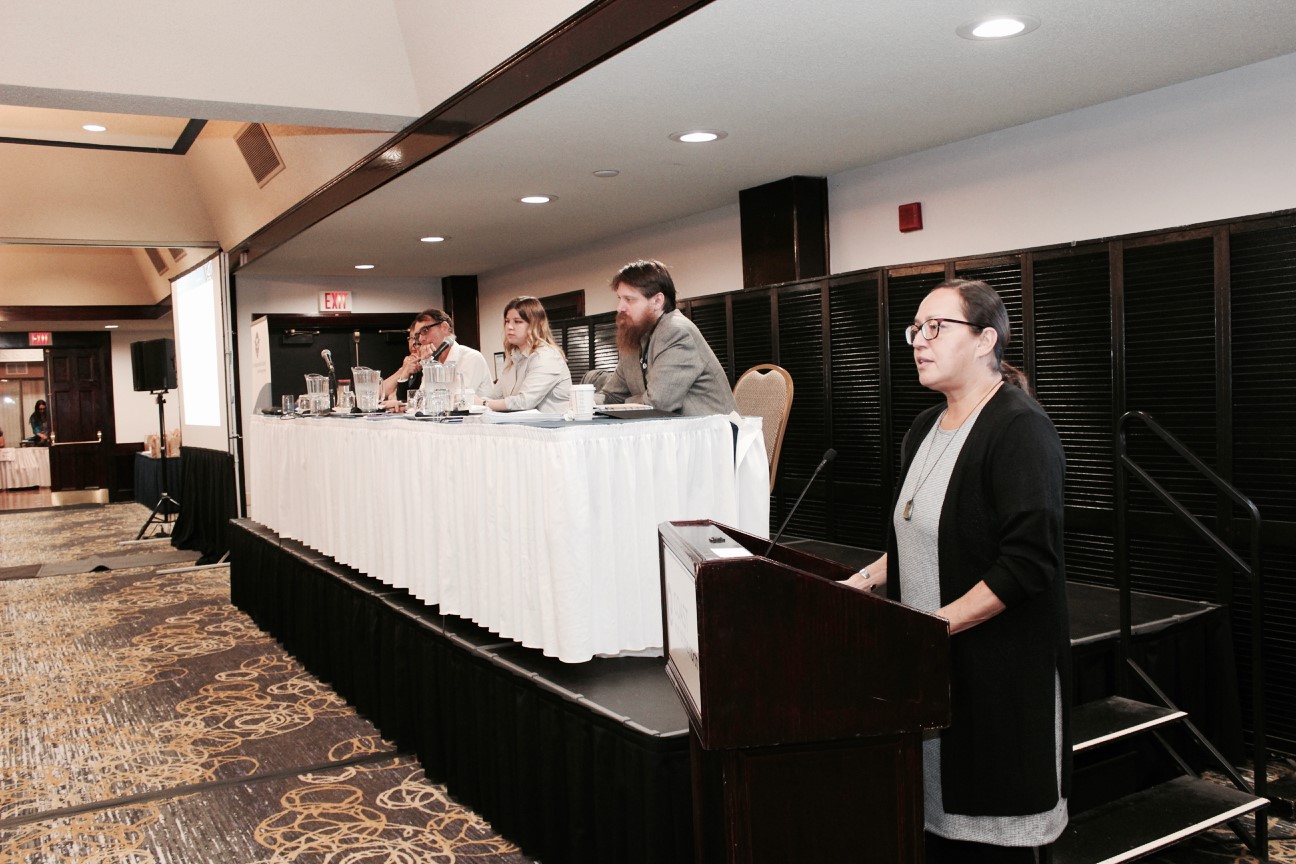
Dr. Nel Wieman, Senior Medical Officer, FNHA presents on Cannabis
Non-Medical Cannabis now legal
FNHA, BC and Canada hosted a panel on the legalization of Non-medical Cannabis and health impacts. David Bever, Senior Policy Analyst for Health Canada, shared that a main driver for legalization was the already high Cannabis usage rates in Canada including consumption among First Nations people. "Government took the position at its better to regulate what is already happening in order to lessen harms" said Bever.
Lindsey Skwarok Ministry of Public Safety & Solicitor General explained how B.C.'s role was to adopt the federal framework of rules and regulations and gives it provincial expression. Skwarok said that, "ending 100 years of prohibition represents perhaps the most significant policy change we will see in our lifetimes and that the regulatory landscape will continue to evolve." Dr. Nel Wieman [Anishnawbe], Senior Medical Officer with FNHA brought the conversation closer to home describing "Fundamentally, people use substances to change how they feel. We know recreational Cannabis is being used medically to address historical or contemporary trauma in the absence of access to health care."
Wieman also described why the FNHA is focusing its education efforts on youth "Until the age of 25 the brain is considered vulnerable to injury. Young people - that use Cannabis frequently, and in large amounts, are at risk. We know that 'just say no' hasn't worked so our campaign #indigenousstrengths encourages young people to make informed decisions." A rich question and answer period followed with many delegates sharing personal stories of medical and non-medical cannabis use.
Annual report and accountability discussion
Dr. Liz Whynot and Norman Thompson, FNHA Board of Directors presented the 2017/2018 annual report and financials. In discussing the year end highlights Dr. Whynot reflected progress and setbacks against the 2017/2018 service plan, Norman Thompson reviewed the financial report for 2017/2018 and shared a four-year retrospective on FNHA investments. He highlighted that in the last four years there has been a 38% increase in community contribution agreement funding. The question and answer period that followed focused on the increased cost of governance and honorariums, and challenges with the health authority complaints process.
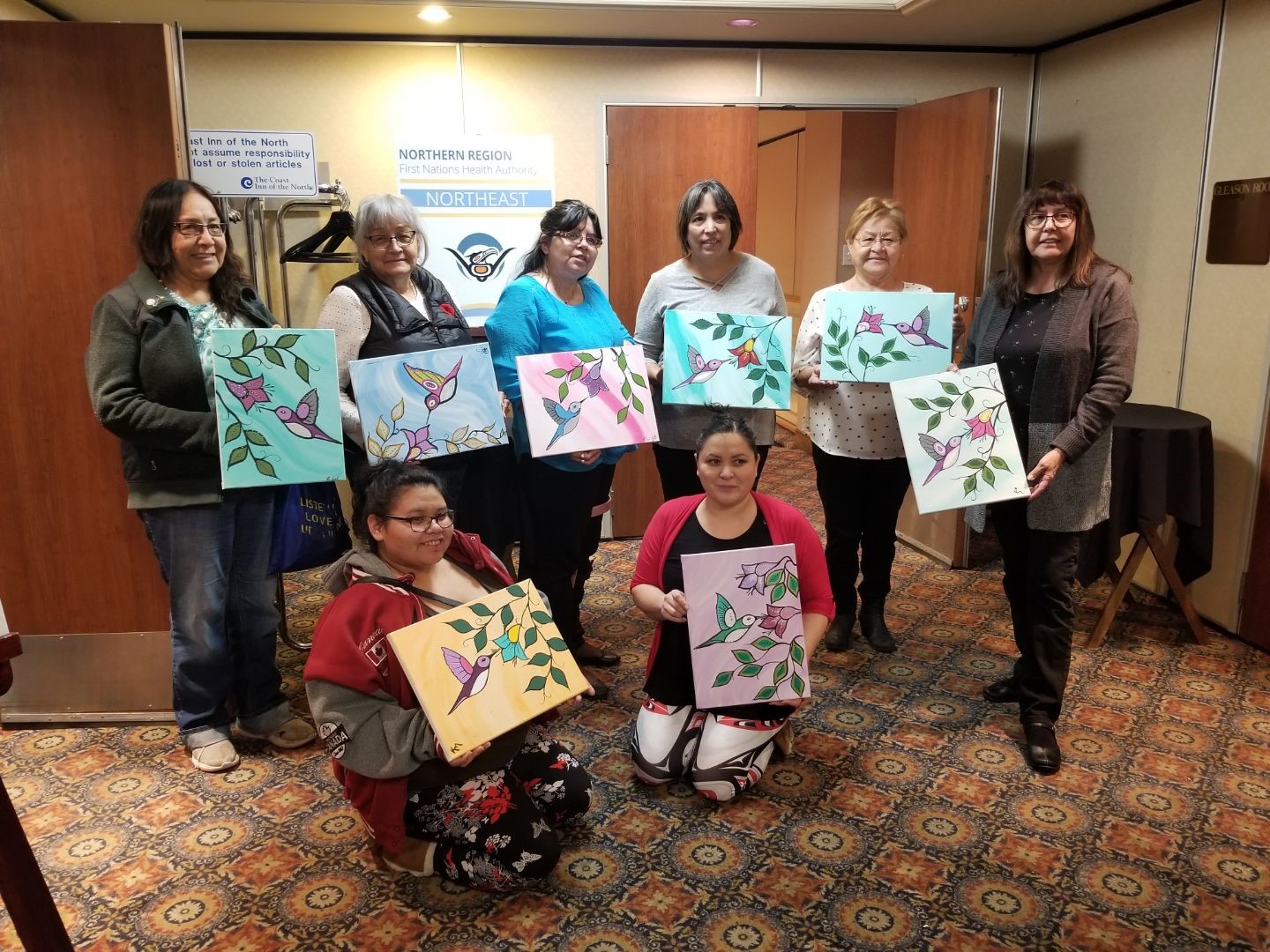
Participants pose with their finished artwork after a wellness event during the Northern Regional Caucus
The Opioid Public Health Crisis
An expert panel on the opioid public health crisis was opened by Bev Lambert who shared "After my son died, for 10 years I sat in silence. I didn't realize how liberating it would be for other people if I shared my story." she said gesturing to the quilt displayed with names of fallen loved ones "Each square represents a loved one and with this quilt we naming them, we are remembering them, we are lifting them up. We are taking away the shame and blame from living with unresolved trauma. I wanted to give my son his liberation, I wanted his spirit to soar."
Northern Health Chief Medical Health Officer Dr. Sandra Allison explained that it is this shame that continues to drive substance use underground. "People use drugs alone because they are ashamed, this stigma is killing us" Dr. Allison recalled that in 2015 Medical Health Officers were told by the coroners service to pay attention because there were a lot of people dying. She noted that most in the room felt these deaths long before this emergency officially hit." One of these individuals is Chief Jackie Thomas of Saikuz First Nation who described the toll of the crisis in her community "We had 12 ambulance calls in three months in our community. We responded. Our entire council got trained in naloxone along with 30 other community members. We're taking steps to reduce stigma and educate membership. We haven't had an ambulance in our community in a couple of months so that is something to celebrate. People are quitting on their own, but they are relapsing because the real work is healing from the underlying trauma" said Chief Thomas.
Training is central to the northern response to the opioid crisis according to Karla Tait [Wet'suwet'en], regional Mental Wellness Manager for the North. "We've trained 15 community-based addiction workers in the Chemical Addiction Worker Certificate. Now for the first time, we are establishing baseline competencies across the north." According to Tait the overall number of addictions workers is also on the rise because of escalator funding. Some communities will for the first time have two workers, and with it the opportunity to bring gender balance or complimentary skill sets. Patricia Jones, the new Northern Addictions Specialist is optimistic that staff burnout can be mitigated by the development of a community of practice for NNADAP workers.
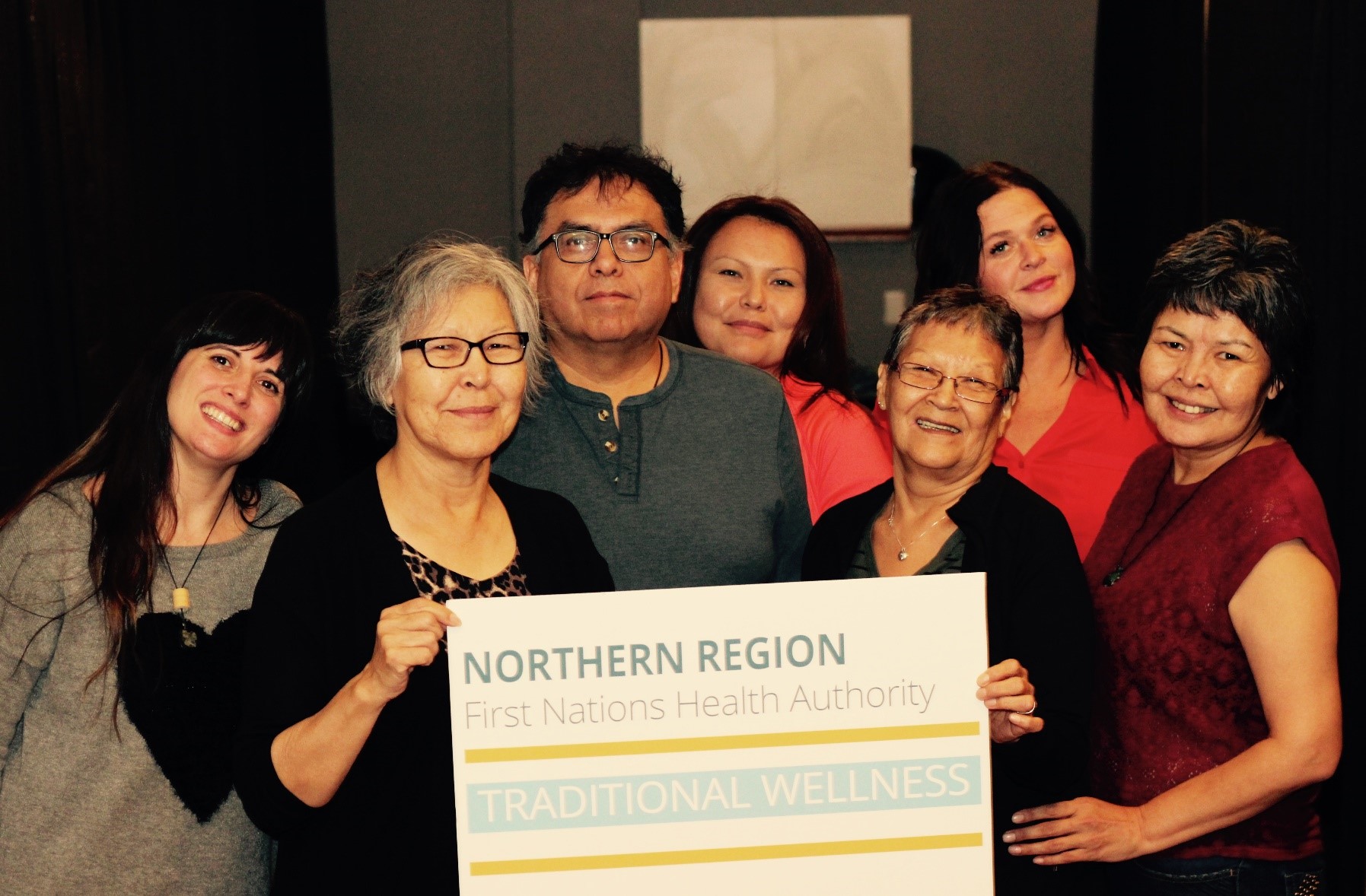
Delegates at the Northern Caucus participated in 178 traditional healing sessions over the three day event. "We are connecting with our ancestors who give us the strength to face the challenges of today." said Julie Morrison [Gitxsan Nation] Crisis Response with FNHA who helped organize the sessions. "If we take care of leadership and those working in health they are stronger in their work to serve community and to bring these practices back home." Delegates had the opportunity to access a number of traditional wellness services including Body Works with Tom Smith and Laura Cook; Adah Dene Society (Ft St James) Margo Sagalon, Violet Prince, Tracey Sam, Terry Johnny, and Bailey Hunter (Ft St. John)
Health Benefits
A presentation about improvement of vision, dental and medical supplies equipment was co-hosted by the FNHA and First Nations Health Directors Association (FNHDA). Jackie MacPherson [Sylix] and Beverly Clifton Percival [Gitxsan] described how First Nations Health Directors are taking a more active role in the health benefits program. "We are involved this time" said MacPherson "I encourage you to participate and give us clear direction through the FNHDA technical advice process."
The panel described the work ahead and encouraged delegates to participate in the third-party Plan W evaluation which is underway and reviewing program efficiency and effectiveness in the areas of governance, risk management and controls. The evaluation according to Darren McKnight, Director Health Benefits Management, will be shared with community and used to guide the transition of future benefits changes.
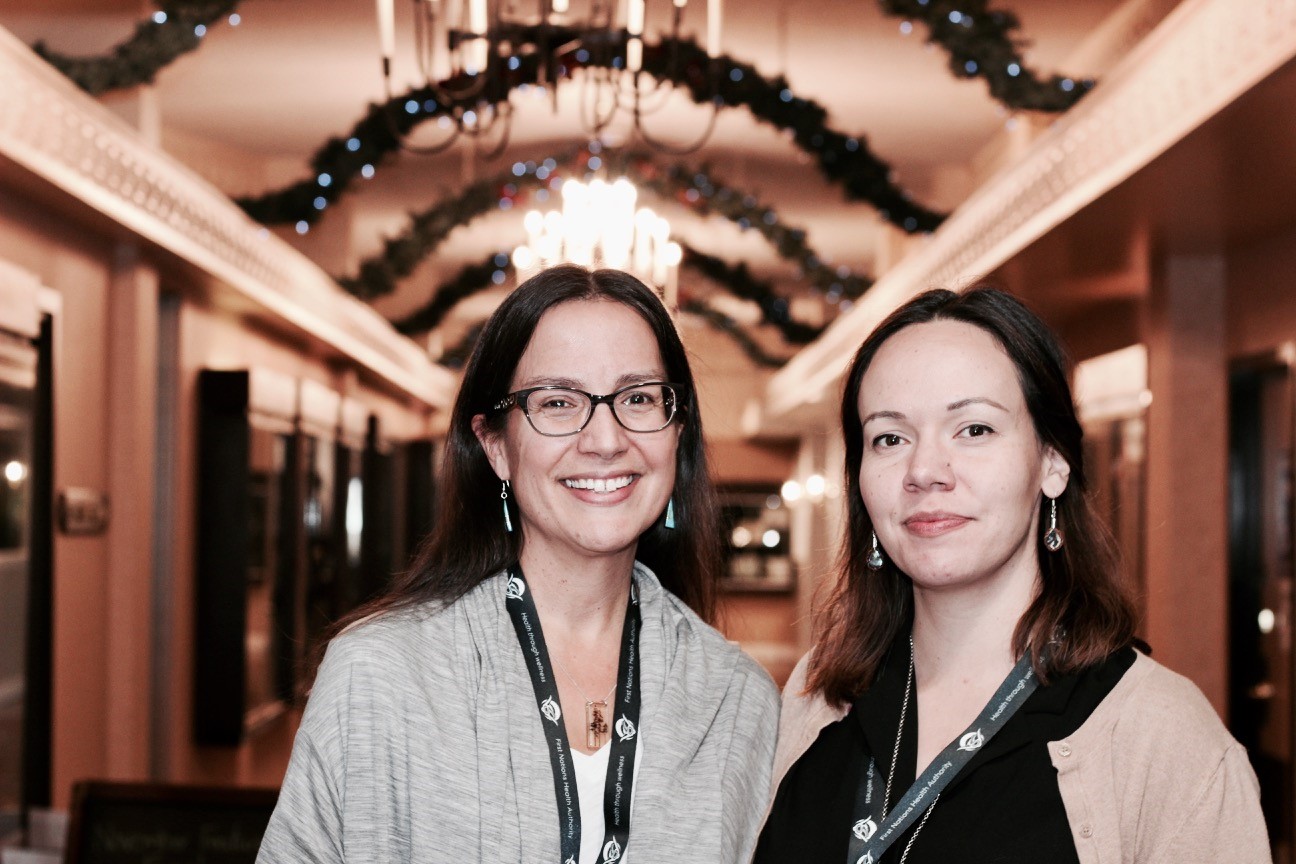
Dr. Nadine Caron [Ojibwe] (left) and Nicole Cross [Nisga'a] Regional Executive Director, Northern Region FNHA pause for moment following Dr. Caron's lunchtime presentation on the Northern Biobank initiative.
On changing the way we think
Louella Nome, Health Director, Lhedli T'enneh delivered a powerful and direct talk to her peers on the final day of the Northern Caucus. "I really believe in holding each other up. As frontline workers we face the backlash of what arises in our client's lives. It's important that we don't personalize, because that gets in the way of doing our best." She urged health directors to bring this kindness home, noting this can be a big blind spot when we are burnt out. "We can be harder on our families than we are at work, sometimes all the teachings go out the window when it comes to home life."
Nome's presentation, peppered with personal stories and delivered with humility closed with a simple message "We brew on things that are not important, it affects our role in communities, our role in homes, our organizations that we work for. If we start our day with kindness we are going to start our day with a different mindset."

